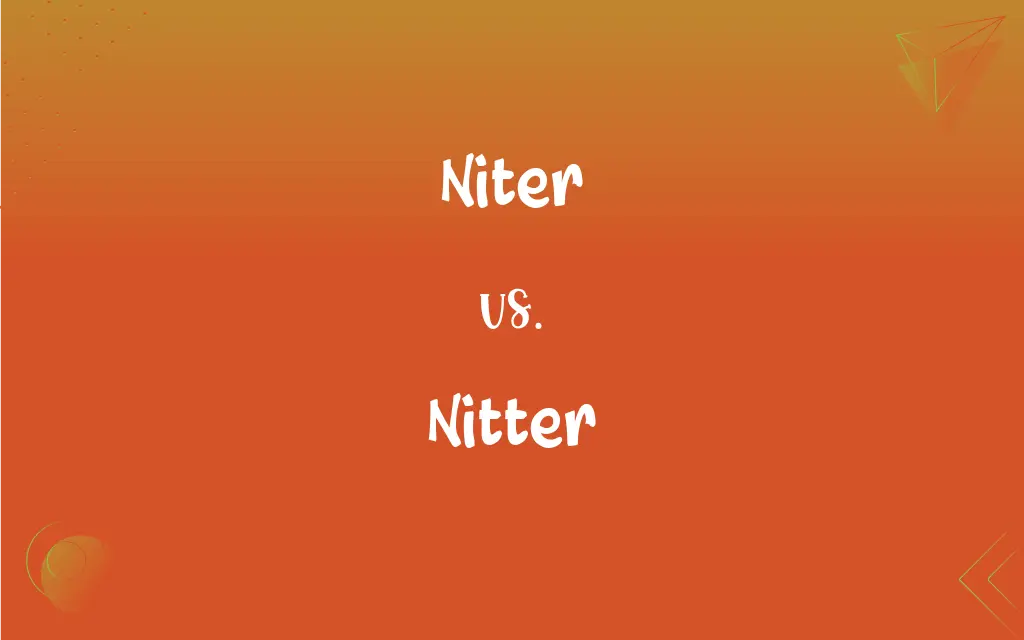Niter vs. Nitter: What's the Difference?
By Harlon Moss & Janet White || Updated on May 24, 2024
Niter, also known as saltpeter, is a chemical compound used in fertilizers and explosives. Nitter is an informal term referring to a person who frequently uses or is addicted to Twitter.

Key Differences
Niter, chemically known as potassium nitrate, is widely used in agriculture as a fertilizer. Nitter, on the other hand, is a colloquial term derived from combining "Twitter" and "user," indicating someone heavily engaged on Twitter.
Niter plays a crucial role in the production of gunpowder and explosives, making it significant in mining and military applications. Conversely, nitter is unrelated to chemicals or industry, referring instead to online social behavior.
Niter occurs naturally as mineral deposits and has historical importance in preserving meat due to its nitrate content. Meanwhile, nitter has no physical presence or historical significance; it reflects modern digital culture and social media usage.
Niter is also used in food preservation, particularly in curing meats, where it inhibits bacterial growth. Whereas nitter is a term that might describe someone's online habits, it doesn't pertain to physical processes or chemical reactions.
Niter has regulatory and safety considerations due to its explosive potential, requiring careful handling. In contrast, nitter poses no physical dangers but might highlight concerns about social media addiction and its impact on mental health.
ADVERTISEMENT
Comparison Chart
Definition
Chemical compound (potassium nitrate)
Informal term for an avid Twitter user
Primary Use
Fertilizers, explosives
Describes social media behavior
Physical Form
Solid mineral
No physical form
Historical Importance
Used in food preservation, gunpowder
No historical significance
Safety Considerations
Requires careful handling
Related to potential digital addiction
ADVERTISEMENT
Niter and Nitter Definitions
Niter
A naturally occurring mineral known as saltpeter.
Niter deposits can be found in arid regions.
Nitter
Informal term for an active Twitter user.
Being a nitter, he knows all the latest Twitter trends.
Niter
A white crystalline compound used in fertilizers.
Farmers use niter to enrich the soil.
Nitter
Someone addicted to social media, specifically Twitter.
The nitter spent hours scrolling through tweets.
Niter
An essential ingredient in gunpowder.
The fireworks contain niter for the explosion.
Nitter
A person who frequently uses Twitter.
As a nitter, she tweets multiple times a day.
Niter
A chemical that inhibits bacterial growth.
Niter helps keep preserved foods safe to eat.
Nitter
A person engaged in Twitter discussions.
The nitter joined the conversation about the new policy.
Niter
Used in meat curing to prevent spoilage.
The sausage recipe includes niter for preservation.
Nitter
A habitual tweeter.
The nitter shared his thoughts on the game instantly.
Niter
See potassium nitrate.
Nitter
(zoology) A louse that deposits nits on horses.
Niter
(obsolete) Native sodium carbonate; natron.
Nitter
The horse louse; an insect that deposits nits on horses.
Niter
A mineral form of potassium nitrate (saltpetre) used in making gunpowder.
Niter
A white crystalline semitransparent salt; potassium nitrate; saltpeter. See Saltpeter.
Niter
Native sodium carbonate; natron.
For though thou wash thee with niter, and take thee much soap, yet thine iniquity is marked before me.
Niter
(KNO3) used especially as a fertilizer and explosive
FAQs
Does nitter have any chemical properties?
No, nitter refers to a person and has no chemical properties.
What is the main component of niter?
Potassium nitrate is the main component of niter.
What is niter?
Niter is a chemical compound known as potassium nitrate used in fertilizers and explosives.
How is niter used in agriculture?
Niter is used as a fertilizer to enrich soil.
Can niter be used in food preservation?
Yes, niter is used in curing meats to prevent spoilage.
Is nitter a formal term?
No, nitter is an informal, colloquial term.
Is there any safety concern with handling niter?
Yes, niter can be hazardous and requires careful handling due to its explosive potential.
Where is niter naturally found?
Niter is found in mineral deposits, especially in arid regions.
What is a nitter?
A nitter is an informal term for a person who frequently uses or is addicted to Twitter.
What historical significance does niter have?
Niter has been historically important in making gunpowder and preserving food.
Are there any health concerns associated with being a nitter?
Excessive use of social media, indicated by the term nitter, can impact mental health.
What industries rely on niter?
Agriculture, mining, and the military are primary industries that use niter.
Is niter the same as saltpeter?
Yes, niter is also known as saltpeter.
Why is niter important in food curing?
Niter helps inhibit bacterial growth, making it crucial for meat preservation.
What does a nitter typically do?
A nitter actively uses Twitter, often posting and engaging with content frequently.
Can nitter be considered a slang term?
Yes, nitter is considered slang.
Can the term nitter apply to users of other social media platforms?
The term nitter is specifically related to Twitter users.
How should niter be stored?
Niter should be stored in a cool, dry place away from combustible materials.
What are some products made using niter?
Fertilizers, gunpowder, and preserved meats are common products.
Do nitters contribute to social media trends?
Yes, nitters are often active participants in shaping social media trends.
About Author
Written by
Harlon MossHarlon is a seasoned quality moderator and accomplished content writer for Difference Wiki. An alumnus of the prestigious University of California, he earned his degree in Computer Science. Leveraging his academic background, Harlon brings a meticulous and informed perspective to his work, ensuring content accuracy and excellence.
Co-written by
Janet WhiteJanet White has been an esteemed writer and blogger for Difference Wiki. Holding a Master's degree in Science and Medical Journalism from the prestigious Boston University, she has consistently demonstrated her expertise and passion for her field. When she's not immersed in her work, Janet relishes her time exercising, delving into a good book, and cherishing moments with friends and family.































































